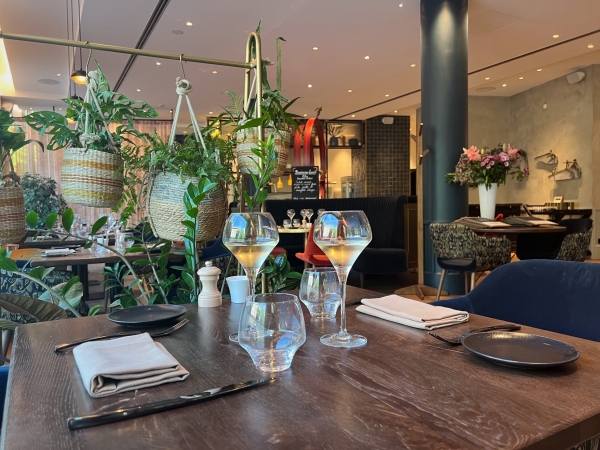Wine production in Belgium on a high – thanks to climate change

That is partly due to a phenomenon we have all come to know about of late – climate change.
Warming temperatures – clearly evident this summer throughout Europe and the rest of the world – is helping wine growers enormously in Belgium.
“Better weather means a better grape,” declares Pierre-Marie Despatures, who is part of a team running a highly successful organic vineyard near Namur in Wallonia.
His wine estate, Domaine du Chenoy, has already made a name for itself and its wines rank well when compared with others in France and elsewhere.
Pierre-Marie was on hand to explain some of the secrets of their success” at event in Brussels on 7 September.
The “Sofitel Wine Days”, part of a series of similar events, was an opportunity to take stock of wine production in Belgium and also sample the delights of a culinary offering from “The 1040”, a popular restaurant at Sofitel Brussels Europe, located in the city’s EU Quarter.
AdvertisementThe hotel itself has just recently reopened its rooftop terrace/bar which gives lovely panoramic views across the locality. The terrace, open for drinks and snacks to both hotel guests and non residents, has been totally refurbished with a new roof and flooring.
Of course, wine production, as explained by Pierre-Marie, is not new to Belgium.
Indeed, Domaine Du Chenoy this year celebrates its 20th anniversary.During that period it has survived everything from a major fire and an economic crisis to the health pandemic but has managed to prove a big success.
The winery was originally started by a Belgian, Philippe Grafe, who acquired the land in 2003. At the time, it comprised of 11 hectares of land with a 15 percent slope facing south.
Five years ago Pierre-Marie, along with his brother Jean-Bernard – a wine expert – joined the management team and they have overseen what is a highly successful operation, now spread over 15 hectares.
The estate now produces about 100,000 bottles per year, 70 per cent of which is sparking wine (with the rest being red, white and rose).
It does not sell to supermarkets but to smaller retailers and some 20 per cent of its wine sales are from its own estate in Wallonia.
Belgium has, in recent years, been lauded for the quality of its sparkling wine.
Belgian sparkling wine was selected by the judges of the international wine competition in Brussels to win the 2019 International Revelation Sparkling wine award, over several French champagnes. The 2014 Cuvée Prestige from Chant d’Éole in Quévy beat 730 submissions, including several French champagnes for the first time in the competition’s 26-year history.
The outcome took many by surprise, not least French competitors to the extent that the numbers had to be double-checked to make sure the tasters had not made a mistake.
Recently, retail giant Colruyt announced it will begin the production of its own organic wines in Belgium with the first bottles appearing on supermarket shelves in 2026.
The group has already planted four hectares of vines at La Croisette in Frasnes-les-Anvaing, Hainaut province. Five more hectares will follow next year.
According to Pierre-Marie climate change, while being a major concern in so many other areas, cannot but help but boost wine production in Belgium.
He told this website: “It is a good thing for the wine sector in Belgium. It means it is now much easier to plant vines in Belgium than in the past and the better weather means you should have a better grape.”
Combined with the existing expertise in Belgium on wine production and naturally favourable soil conditions, the future looks bright for the country’s wine production.
Pierre-Marie said his team take great pride in being “completely organic” and in using “disease-resistance” grapes.
“We try,” he added, “to combine all this with doing something that produces originality as well. We do not want our wines to be too different to what people are used to but, at the same time, we aim to do something that is original to Belgium and which is actually based in this country.”
He estimates that, in Wallonia, some 2 million bottles are produced annually, adding, “this is a figure that is growing fast.”
His brother learned about the wine trade during his time in Bordeaux which included the position of director of Chateaux Anthonic and Dutruch Grand Poujeaux. It was there that he met the renowned oenologist Eric Boissenot who would later blend the wines of Domaine du Chenoy.
The idea that Belgium might rival mighty France for, say sparkling wine, would have been laughable a few years ago but this is changing and changing fast.
Turning again to the key role of climate change in the popularity and success of Belgian wine production, Pierre-Marie adds, “Yes, this can have a positive impact.
“But I would also caution that the extreme weather events we have also seen, such as violent storms and very heavy rains, can be detrimental.”
Looking to the future of his own business, he hopes the estate will continue to grow – possibly to about 20 hectares within five years – with a three-fold emphasis remaining at the heart of all of its work.
This, he insists, includes originality, staying local and favouring an organic approach.
Share this article:



